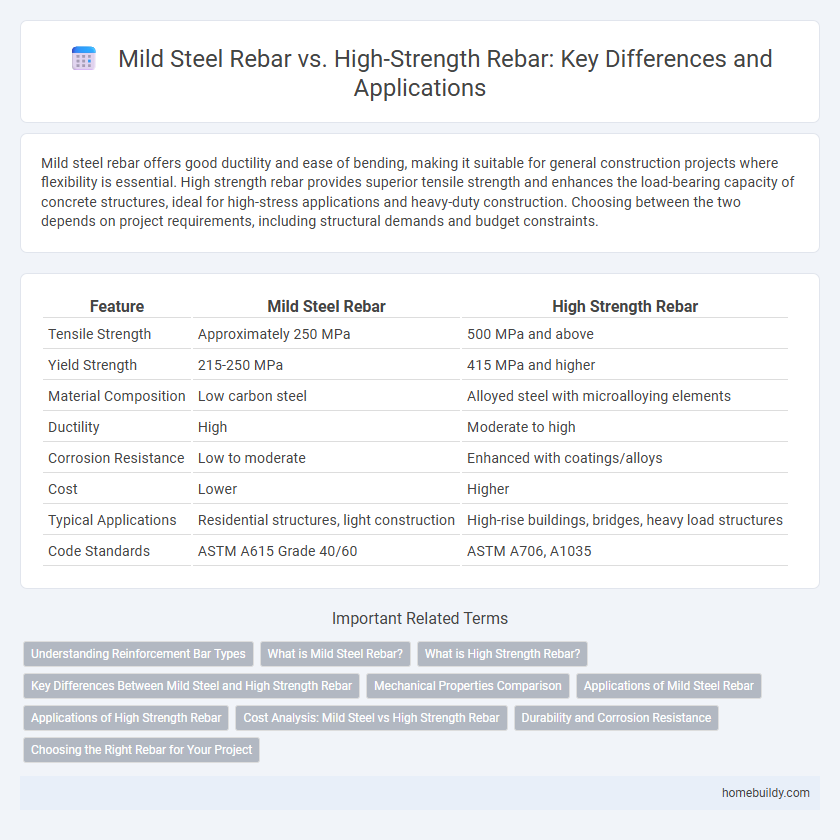Mild steel rebar offers good ductility and ease of bending, making it suitable for general construction projects where flexibility is essential. High strength rebar provides superior tensile strength and enhances the load-bearing capacity of concrete structures, ideal for high-stress applications and heavy-duty construction. Choosing between the two depends on project requirements, including structural demands and budget constraints.
Table of Comparison
| Feature | Mild Steel Rebar | High Strength Rebar |
|---|---|---|
| Tensile Strength | Approximately 250 MPa | 500 MPa and above |
| Yield Strength | 215-250 MPa | 415 MPa and higher |
| Material Composition | Low carbon steel | Alloyed steel with microalloying elements |
| Ductility | High | Moderate to high |
| Corrosion Resistance | Low to moderate | Enhanced with coatings/alloys |
| Cost | Lower | Higher |
| Typical Applications | Residential structures, light construction | High-rise buildings, bridges, heavy load structures |
| Code Standards | ASTM A615 Grade 40/60 | ASTM A706, A1035 |
Understanding Reinforcement Bar Types
Mild steel rebar offers ductility and ease of bending, making it suitable for structures requiring flexibility under stress, while high strength rebar provides superior tensile strength, enhancing load-bearing capacity in heavy-duty applications. Understanding the mechanical properties, such as yield strength and elongation, helps engineers select the appropriate reinforcement bar type for specific construction needs. High strength rebar often contains alloying elements like chromium or vanadium to improve performance, whereas mild steel rebar is primarily carbon steel with lower tensile strength.
What is Mild Steel Rebar?
Mild steel rebar is a type of reinforcement bar made from low-carbon steel, commonly used in construction for its ductility and weldability. It offers moderate tensile strength, making it suitable for standard structural applications where high stress resistance is not critical. Mild steel rebar is preferred in projects requiring ease of bending and shaping while maintaining adequate reinforcement properties.
What is High Strength Rebar?
High strength rebar is a type of reinforcement bar made from alloy steel or carbon steel with enhanced tensile strength, typically exceeding 60,000 psi, compared to mild steel rebar which usually has tensile strength around 40,000 to 50,000 psi. This increased strength allows for reduced material usage and improved load-bearing capacity in construction applications, making it ideal for high-stress environments. High strength rebar also exhibits better corrosion resistance and fatigue performance, crucial for long-lasting structural integrity.
Key Differences Between Mild Steel and High Strength Rebar
Mild steel rebar is characterized by lower tensile strength typically around 250 MPa, making it more ductile and easier to bend, while high strength rebar offers tensile strengths exceeding 500 MPa, providing greater load-bearing capacity and reduced material usage. High strength rebar usually contains alloying elements such as carbon, manganese, and sometimes micro-alloying agents that improve its mechanical properties, in contrast to the relatively plain composition of mild steel rebar. Corrosion resistance and fatigue life also differ significantly, with high strength rebar often engineered for enhanced durability in harsh environments compared to mild steel rebar.
Mechanical Properties Comparison
Mild steel rebar typically exhibits a tensile strength of around 400-550 MPa, whereas high strength rebar can reach tensile strengths exceeding 600 MPa, enhancing load-bearing capacity and structural integrity. The yield strength of high strength rebar is significantly higher, usually above 500 MPa, compared to mild steel's lower range of 250-400 MPa, which enables better resistance to deformation under stress. High strength rebar also offers improved ductility and fatigue resistance, making it suitable for critical construction applications requiring enhanced mechanical performance.
Applications of Mild Steel Rebar
Mild steel rebar is widely used in residential construction due to its ductility and ease of bending, making it ideal for reinforcing concrete in foundations, slabs, and beams. Its moderate tensile strength suits applications where structural loads are relatively low and flexibility is crucial. Mild steel rebar is preferred in projects requiring cost-effective reinforcement with reliable performance under normal loading conditions.
Applications of High Strength Rebar
High strength rebar is widely used in construction projects requiring enhanced load-bearing capacity and seismic resistance, such as high-rise buildings, bridges, and infrastructure developments. Its superior tensile strength allows for reduced steel quantities, optimizing structural design and cost-efficiency. Applications in heavy-duty foundations and precast concrete elements benefit from high strength rebar's durability and performance under dynamic stress.
Cost Analysis: Mild Steel vs High Strength Rebar
Mild steel rebar generally offers lower initial costs compared to high strength rebar due to its widespread availability and simpler manufacturing process. High strength rebar, though more expensive upfront, can reduce overall project costs by allowing for smaller diameter bars and less material usage while maintaining structural integrity. A detailed cost analysis must consider long-term benefits such as durability, reduced labor, and transportation savings associated with high strength rebar.
Durability and Corrosion Resistance
Mild steel rebar offers moderate durability with susceptibility to corrosion, requiring protective coatings for longevity in concrete structures. High strength rebar, typically made from alloyed steel, provides superior durability and enhanced corrosion resistance due to improved material properties and specialized treatments. These characteristics make high strength rebar ideal for environments exposed to moisture, chemicals, and harsh weather conditions, extending the service life of reinforced concrete.
Choosing the Right Rebar for Your Project
Mild steel rebar offers excellent ductility and ease of welding, making it ideal for structures requiring flexibility and moderate load-bearing capacity. High strength rebar provides superior tensile strength and corrosion resistance, suitable for high-stress environments and heavy-duty construction. Selecting the right rebar depends on project-specific factors such as load requirements, environmental conditions, and budget constraints to ensure structural integrity and longevity.
Mild Steel Rebar vs High Strength Rebar Infographic

 homebuildy.com
homebuildy.com